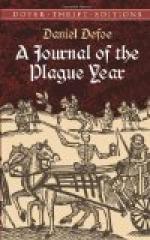It is to be noted here that the dead carts in the city were not confined to particular parishes; but one cart went through several parishes, according as the number of dead presented. Nor were they tied[149] to carry the dead to their respective parishes; but many of the dead taken up in the city were carried to the burying ground in the outparts for want of room.
At the beginning of the plague, when there was now no more hope but that the whole city would be visited; when, as I have said, all that had friends or estates in the country retired with their families; and when, indeed, one would have thought the very city itself was running out of the gates, and that there would be nobody left behind,—you may be sure from that hour all trade, except such as related to immediate subsistence, was, as it were, at a full stop.
This is so lively a case, and contains in it so much of the real condition of the people, that I think I cannot be too particular in it, and therefore I descend to the several arrangements or classes of people who fell into immediate distress upon this occasion. For example:—
1. All master workmen in manufactures, especially such as belonged to ornament and the less necessary parts of the people’s dress, clothes, and furniture for houses; such as ribbon-weavers and other weavers, gold and silver lacemakers, and gold and silver wire-drawers, seamstresses, milliners, shoemakers, hatmakers, and glovemakers, also upholsterers, joiners, cabinet-makers, looking-glass-makers, and innumerable trades which depend upon such as these,—I say, the master workmen in such stopped their work, dismissed their journeymen and workmen and all their dependents.
2. As merchandising was at a full stop (for very few ships ventured to come up the river, and none at all went out[150]), so all the extraordinary officers of the customs, likewise the watermen, carmen, porters, and all the poor whose labor depended upon the merchants, were at once dismissed, and put out of business.
3. All the tradesmen usually employed in building or repairing of houses were at a full stop; for the people were far from wanting to build houses when so many thousand houses were at once stripped of their inhabitants; so that this one article[151] turned out all the ordinary workmen of that kind of business, such as bricklayers, masons, carpenters, joiners, plasterers, painters, glaziers, smiths, plumbers, and all the laborers depending on such.
4. As navigation was at a stop, our ships neither coming in or going out as before, so the seamen were all out of employment, and many of them in the last and lowest degree of distress. And with the seamen were all the several tradesmen and workmen belonging to and depending upon the building and fitting out of ships; such as ship-carpenters, calkers, ropemakers, dry coopers, sailmakers, anchor-smiths, and other smiths, blockmakers, carvers, gunsmiths, ship-chandlers, ship-carvers, and the like. The masters of those, perhaps, might live upon their substance; but the traders were universally at a stop, and consequently all their workmen discharged. Add to these, that the river was in a manner without boats, and all or most part of the watermen, lighter-men, boat-builders, and lighter-builders, in like manner idle and laid by.




